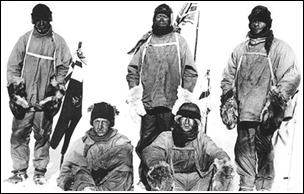Follow in the footsteps of Scott of the Antarctic (without leaving London)

To celebrate the centenary of Captain Scott’s expedition to the South Pole visitors to WWT London Wetland Centre can take part in their own ‘expedition’. Throughout March families will have the chance to find out if they have what it takes to complete a polar trek. A special Antarctic walk, the ‘Great Scott Discovery Trail’, tests would-be explorers on their basic survival knowledge as they make their way from Base Camp to the Pole.
The Scott family has a special significance for the Wildfowl & Wetlands Trust (WWT) as Captain Scott’s son, Peter, went on to found the Trust. It was his vision that led to WWT creating London Wetland Centre in 2000.
Along the ‘Great Scott Discovery Trail’ visitors can see clothing, food, sledges and equipment used by today’s polar explorers. There are also display panels on polar exploration and Captain Scott and his team of adventurers. You’ll be able to find out what food supplies explorers would need to take and see the type of sledge a modern explorer would pull, filled with all the equipment he would need for the journey. The exhibition also explains why the Antarctic is a ”No Poo Zone”!
Although Captain Scott reached the South Pole, sadly he and his team did not survive their journey home. What’s more, their aim to be the first team to reach the pole was thwarted by the Norwegian Roald Amundsen who beat them to their goal. Nevertheless, Scott and his team were hailed as heroes and the explorer’s son, Sir Peter Scott, became an international conservationist. Inspired by his father’s journey, Sir Peter played an important role in drawing up the Antarctic Treaty, protecting the environment in Antarctica.
He also founded WWT which is committed to protecting wetland wildlife and habitats in the UK and around the world. Sir Peter’s vision for bringing together wildlife and people for the benefit of both led to the formation of nine wetland centres around the UK.
Martin Senior, WWT London Wetland Centre’s General Manager, said “Captain Scott’s Antarctic journey is a special moment in our history but also a crucial event in the background of the conservation movement. Thanks to his inspirational leadership and the encouragement he and his wife gave to their son Peter we now have WWT, a well established conservation body protecting wildfowl and their wetland habitats, and WWT London Wetland Centre, a unique nature reserve which has inspired the creation of other urban wetlands around the globe.”
WWT London Wetland Centre was the final nature reserve planned by Sir Peter, who negotiated with Thames Water to allow redevelopment of redundant reservoirs and filter beds in Barnes, South West London.



